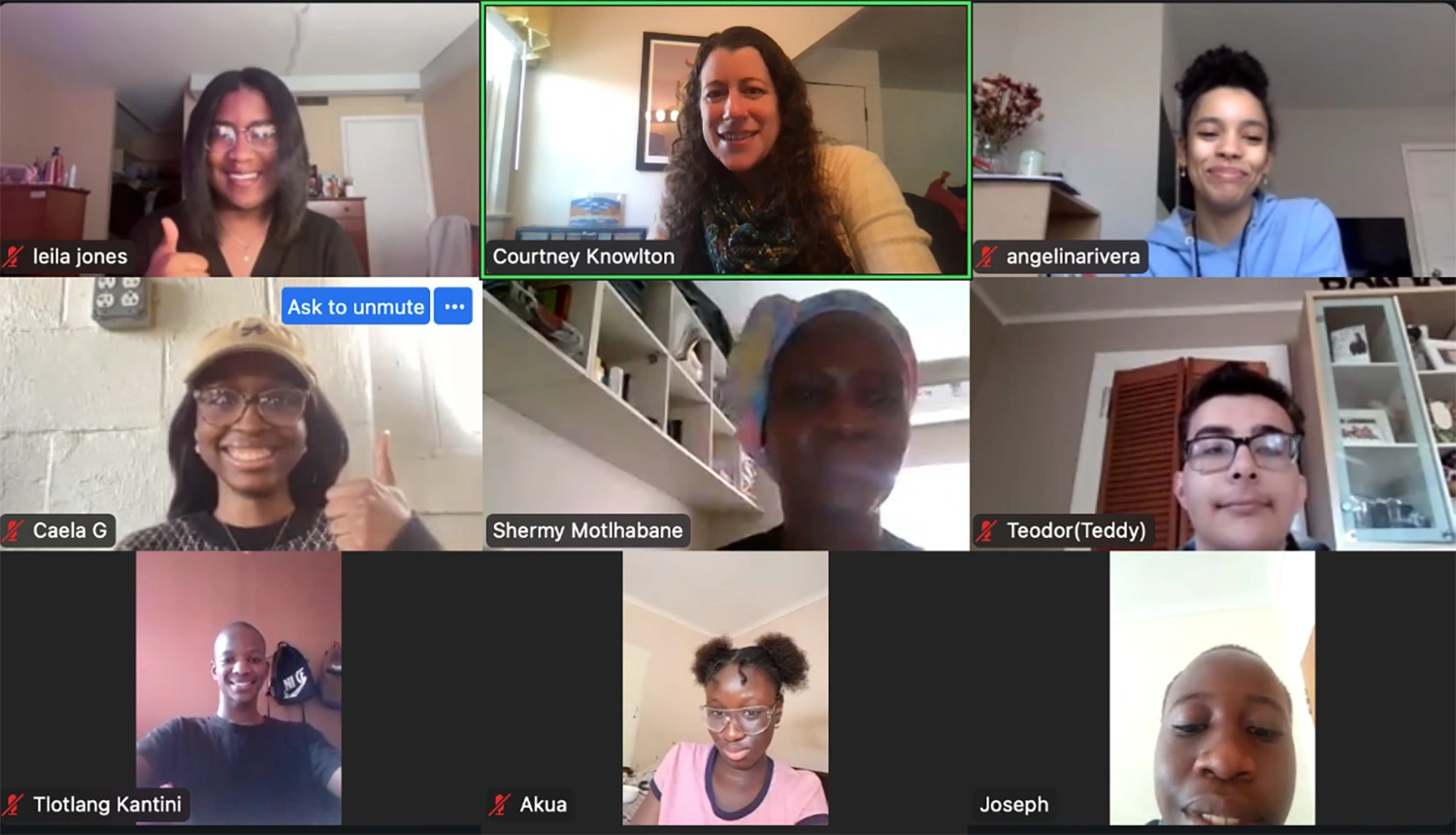Arcadia Students Engage in Linguistic and Cultural Exchange with Botswana’s Naledi Senior Secondary School

A collaboration between Arcadia University and Naledi Senior Secondary School in Botswana is bridging cultural and educational gaps through a virtual exchange program that fosters global learning and mutual understanding.
The Arcadia and Naledi Cultural and Study Exchange gives Arcadia students the opportunity to tutor Naledi students in reading strategies to prepare for their English exams. In the process, Naledi students have taught Arcadia students some Setswana, the primary language spoken in Botswana, and about their lives and culture in Southern Africa. Adjunct Professor of Education Courtney Knowlton ’10, ’12MEd and Professor of Education and Faculty Director of the Center for Teaching, Learning, and Mentoring Dr. Ellen Skilton created the program with support from Arcadia’s School of Education.
“We have a Teaching English as a Foreign Language (TEFL) certificate at Arcadia and want to be able to provide meaningful international teaching experiences for our students,” said Dr. Skilton. “This virtual experience with Naledi Senior Secondary School is a wonderful opportunity for understanding English language teaching in other parts of the world.”
“At the beginning of the Zoom, we facilitate an activity to help the students get to know each other and introduce the reading skill that the students will be focusing on in breakout rooms,” Knowlton said. “Then, the Arcadia students lead the small groups, and Ellen and I visit the breakout rooms to offer support when needed.”
The Arcadia students are enrolled in courses such as ED299: Understanding Language Learning and ED300: Teaching English Learners. The program allows them to fulfill the courses’ fieldwork requirements while engaging in a meaningful global exchange.
“During our sessions, I try to foster a growth mindset so that students from Arcadia and Naledi feel more comfortable taking risks and learning from their mistakes,” Knowlton said. “For example, I try to model this mindset during our whole group time as I work on my pronunciation of words in Setswana and ask for guidance from the native speakers. I hope the Arcadia students continue to reflect on ways that they can use a growth mindset to encourage open communication in multicultural environments.”
The partnership has had an impact on both sides of the exchange.
“I’ve learned a lot more about Botswana from this experience, and it gave me the opportunity to connect with others from across the world to learn their language as they learn ours,” explained Leila Jones ’27, who is double majoring in Social Studies Education and Political Science. “For my post-grad teacher and public advocate plans, this has helped me work better with language barriers and with connecting with students of different curriculums and cultures. It has broadened my knowledge of ESL and has given me lessons that I could implement in my future classrooms.”
According to Shermy Motlhabane, a teacher at Naledi during the first two sessions of this exchange, the impact is equally significant for students and educators in Botswana.
“Our time together has immensely enhanced my understanding of making reading or any type of work accessible to learners,” Motlhabane said. “Secondly, spending time every Saturday afternoon with Arcadia staff and students during their Saturday mornings has shown me that nothing is impossible to achieve. I just got my results for the English language test from last year and 90% of my class scored passing on the examination.”
Naledi students Tlotlang and Akua also expressed appreciation for the program’s impact on their academic growth.
“I really enjoyed our time together because it really kept me busy,” said Tlotlang. “It helped me to always express what comes to my mind and analyze before answering.”
“I learned so much,” said Akua. “It really taught me to always read the title and try to come up with what the article might be about.”
For Knowlton, this initiative represents a deeper mission—to move beyond singular narratives about African countries and create richer, more nuanced understandings.
“I think it is important to offer more international experiences that involve African countries for students,” she explained. “Many years ago, when I was a student at Arcadia, I was introduced to the TED Talk delivered by Chimamanda Adichie called ‘The danger of a single story.’ As part of her talk, she explains the importance of recognizing that people are made up of multiple stories in order to treat them with dignity. In my experience, many primary and secondary schools have curriculums that often tell a ‘single story’ about people from African countries. As my students and I interact with the teacher and students from Botswana we are learning many more stories about their lives instead of being limited to the ones we were told before.”
Through fostering global connections, the Arcadia and Naledi partnership continues to inspire students to embrace diverse perspectives, cultivate cross-cultural communication skills, and apply their learning in meaningful ways.


